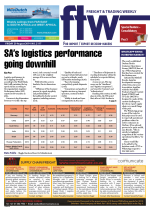Medical and pharmaceutical
cargo as well as emergency
spare parts are boosting
airfreight volumes, according
to Anita Nel, national sales
and customer services
manager for domestic
airfreight consolidator Trans
Airfreight.
General airfreight volumes
are, however, on the decline,
she told FTW.
“This we can attribute to
ever-increasing costs and
customers having to re-think
their method of distribution,
often opting for road freight,”
she said. “In the current
economic environment where
costs are critical, airfreight
is increasingly reserved for
priority or urgent cargo –
which explains the growth in
medical and pharmaceutical
products as well as highvalue
items and urgent
documentation.”
Escalating costs
and tougher security
requirements have weighed
heavily on the industry
globally, and against this
background it’s had no choice
but to re-invent itself, finding
ways of boosting declining
volumes.
“We have, unfortunately,
experienced a drop in
domestic airfreight volumes,”
said Nel.
“Turning this around
remains a priority and
therefore there is major
focus on offering a onestop-
shop service where we
meet customer requirements
speedily and cost-effectively.
At the same time adapting
to industry changes and
requirements is key to
achieving this goal.”
The company works closely
with all domestic airline
suppliers, says Nel. “It is
imperative that new services
that are affordable and costeffective
are introduced in
order to attract more cargo
to airfreight. Flexibility will
also make airfreight a viable
option.”
Compliance with strict
international standards is
another key priority, she
said.
“We have most recently
seen the introduction of the
regulation on the airfreight
of cargo containing
lithium ion batteries
which has forced domestic
consolidators to adapt their
operations to comply,” she
said.
INSERT & CAPTION
There is major
focus on offering
a one-stop-shop
service where we
meet customer
requirements
speedily and costeffectively.
– Anita Nel

